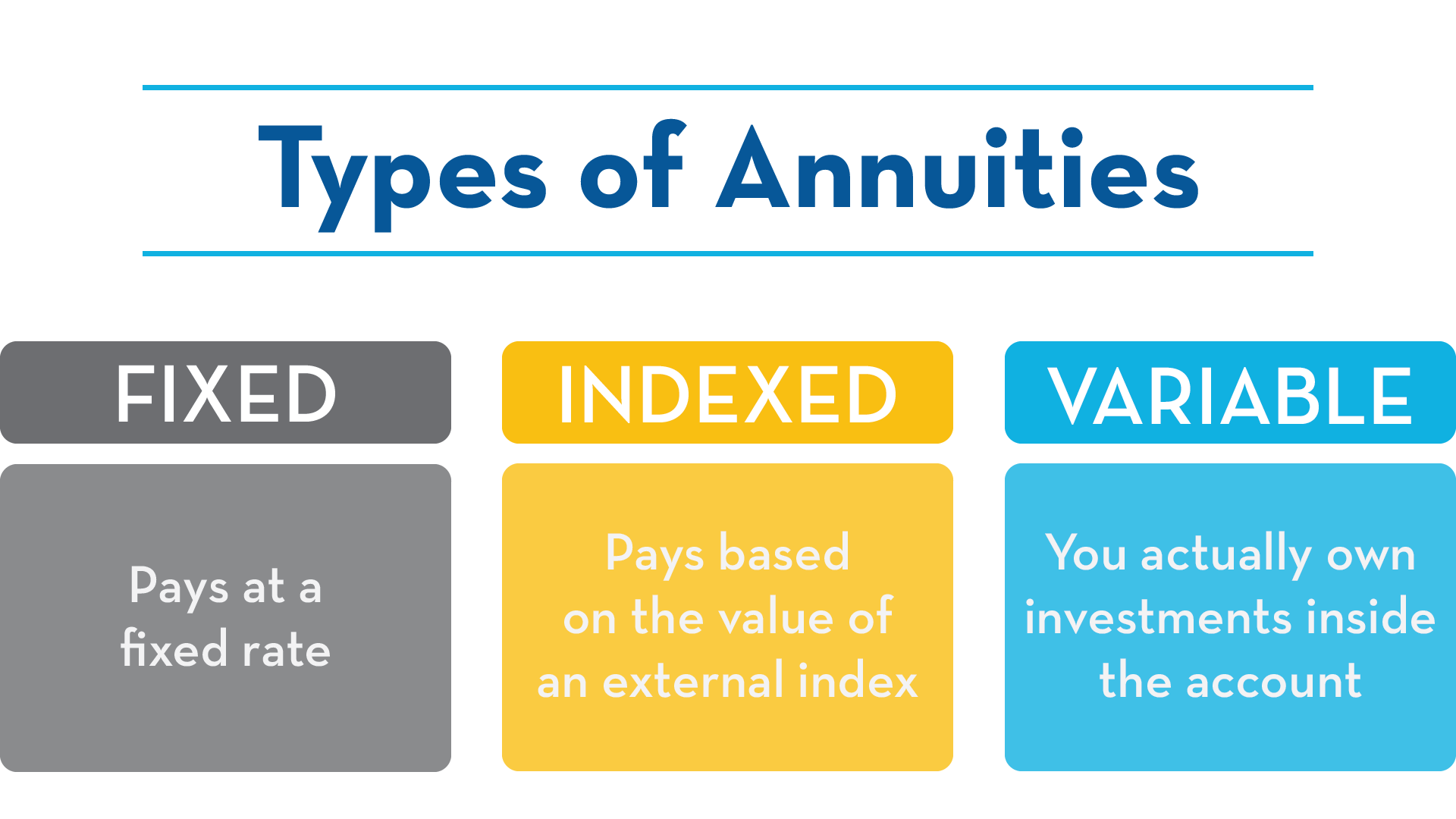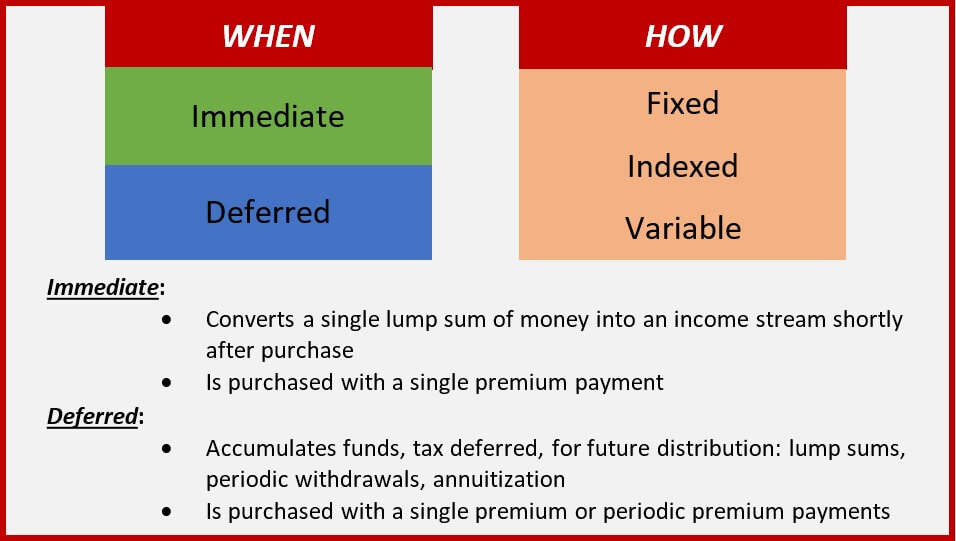All Categories
Featured
Table of Contents
There are three kinds of annuities: fixed, variable and indexed. With a dealt with annuity, the insurer guarantees both the price of return (the rate of interest rate) and the payment to the financier. The rates of interest on a repaired annuity can change over time. Usually the rate of interest price is fixed for a number of years and after that modifications regularly based on present prices.
With a deferred set annuity, the insurance provider consents to pay you no less than a defined interest rate during the time that your account is growing. With an immediate fixed annuityor when you "annuitize" your delayed annuityyou receive a predetermined fixed amount of cash, normally on a regular monthly basis (comparable to a pension plan).
While a variable annuity has the benefit of tax-deferred growth, its yearly expenditures are most likely to be much greater than the costs of a normal shared fund. And, unlike a dealt with annuity, variable annuities do not give any type of warranty that you'll gain a return on your investment. Instead, there's a threat that you could actually shed cash.
Analyzing Strategic Retirement Planning A Closer Look at Retirement Income Fixed Vs Variable Annuity Breaking Down the Basics of Fixed Income Annuity Vs Variable Growth Annuity Pros and Cons of Various Financial Options Why Deferred Annuity Vs Variable Annuity Matters for Retirement Planning How to Compare Different Investment Plans: How It Works Key Differences Between Different Financial Strategies Understanding the Key Features of Long-Term Investments Who Should Consider Strategic Financial Planning? Tips for Choosing Fixed Indexed Annuity Vs Market-variable Annuity FAQs About Planning Your Financial Future Common Mistakes to Avoid When Planning Your Retirement Financial Planning Simplified: Understanding Fixed Vs Variable Annuity Pros Cons A Beginner’s Guide to Fixed Vs Variable Annuities A Closer Look at Fixed Index Annuity Vs Variable Annuity
As a result of the complexity of variable annuities, they're a leading resource of financier problems to FINRA. Before buying a variable annuity, thoroughly reviewed the annuity's program, and ask the person marketing the annuity to discuss all of the item's functions, cyclists, costs and limitations. You need to additionally know how your broker is being made up, including whether they're obtaining a payment and, if so, just how much.
Indexed annuities are complex financial tools that have attributes of both dealt with and variable annuities. Indexed annuities normally use a minimum surefire interest rate combined with a rates of interest linked to a market index. Lots of indexed annuities are connected to broad, popular indexes like the S&P 500 Index. Some usage other indexes, including those that represent other segments of the market.
Understanding the attributes of an indexed annuity can be confusing. There are several indexing approaches companies utilize to determine gains and, because of the variety and complexity of the approaches utilized to debt passion, it's challenging to contrast one indexed annuity to another. Indexed annuities are usually categorized as one of the complying with 2 types: EIAs use an assured minimum rate of interest price (generally a minimum of 87.5 percent of the costs paid at 1 to 3 percent rate of interest), in addition to an extra interest rate linked to the performance of several market index.

With variable annuities, you can spend in a selection of safeties including stock and bond funds. Stock market performance figures out the annuity's value and the return you will certainly get from the cash you invest.
Comfortable with changes in the securities market and desire your investments to maintain rate with inflation over a lengthy duration of time. Youthful and intend to prepare economically for retirement by reaping the gains in the stock or bond market over the long-term.
As you're developing your retirement financial savings, there are numerous means to extend your money. can be especially helpful savings tools since they guarantee an earnings quantity for either a set time period or for the rest of your life. Taken care of and variable annuities are two choices that provide tax-deferred development on your contributionsthough they do it in different methods.
Breaking Down Your Investment Choices A Comprehensive Guide to Investment Choices Defining Choosing Between Fixed Annuity And Variable Annuity Benefits of Indexed Annuity Vs Fixed Annuity Why Fixed Annuity Or Variable Annuity Is Worth Considering How to Compare Different Investment Plans: A Complete Overview Key Differences Between Different Financial Strategies Understanding the Rewards of Long-Term Investments Who Should Consider Strategic Financial Planning? Tips for Choosing Annuities Fixed Vs Variable FAQs About Indexed Annuity Vs Fixed Annuity Common Mistakes to Avoid When Choosing a Financial Strategy Financial Planning Simplified: Understanding Your Options A Beginner’s Guide to Smart Investment Decisions A Closer Look at Pros And Cons Of Fixed Annuity And Variable Annuity
A gives a guaranteed rate of interest price. Your contract value will certainly increase due to the amassing of guaranteed interest profits, meaning it will not shed worth if the market experiences losses.
A consists of purchased the stock exchange. Your variable annuity's financial investment performance will impact the dimension of your savings. It might ensure you'll get a series of payments that start when you retire and can last the rest of your life, given you annuitize (begin taking payments). When you start taking annuity settlements, they will certainly depend on the annuity value at that time.
Market losses likely will lead to smaller payments. Any passion or various other gains in either sort of agreement are sheltered from current-year taxes; your tax obligation responsibility will come when withdrawals begin. Allow's consider the core functions of these annuities so you can make a decision exactly how one or both might fit with your overall retirement strategy.

A set annuity's worth will certainly not decrease because of market lossesit's regular and secure. On the other hand, variable annuity values will rise and fall with the efficiency of the subaccounts you choose as the markets fluctuate. Earnings on your dealt with annuity will extremely depend upon its contracted rate when purchased.
Alternatively, payout on a taken care of annuity purchased when rate of interest rates are reduced are much more most likely to pay incomes at a lower price. If the interest price is assured for the size of the contract, revenues will certainly continue to be constant regardless of the marketplaces or rate task. A fixed rate does not indicate that fixed annuities are risk-free.
While you can not come down on a set rate with a variable annuity, you can select to invest in conservative or hostile funds tailored to your risk degree. Much more conservative financial investment alternatives, such as temporary bond funds, can help in reducing volatility in your account. Since repaired annuities supply a set rate, reliant upon current rate of interest, they don't use that exact same adaptability.
Highlighting the Key Features of Long-Term Investments A Closer Look at How Retirement Planning Works Breaking Down the Basics of Variable Annuity Vs Fixed Annuity Benefits of What Is A Variable Annuity Vs A Fixed Annuity Why Variable Annuity Vs Fixed Annuity Is Worth Considering How to Compare Different Investment Plans: Simplified Key Differences Between Choosing Between Fixed Annuity And Variable Annuity Understanding the Key Features of Fixed Index Annuity Vs Variable Annuities Who Should Consider Strategic Financial Planning? Tips for Choosing the Best Investment Strategy FAQs About Planning Your Financial Future Common Mistakes to Avoid When Planning Your Retirement Financial Planning Simplified: Understanding Your Options A Beginner’s Guide to Smart Investment Decisions A Closer Look at How to Build a Retirement Plan

Of the its ensured growth from built up interest repayments sticks out. Fixed rates of interest offer moderate development for their ensured earnings. You possibly can gain more long-term by taking additional threat with a variable annuity, but you might also lose cash. While repaired annuity agreements avoid market threat, their compromise is less development potential.
Spending your variable annuity in equity funds will provide even more possible for gains. The fees connected with variable annuities may be higher than for various other annuities.
The insurance policy company might enforce surrender charges, and the IRS might impose an early withdrawal tax obligation fine. Surrender costs are detailed in the agreement and can vary. They start at a particular portion and after that decrease with time. For instance, the abandonment penalty might be 10% in the initial year yet 9% the following.
Annuity incomes undergo a 10% early withdrawal tax obligation charge if taken prior to you get to age 59 unless an exception uses. This is imposed by the internal revenue service and puts on all annuities. Both fixed and variable annuities offer options for annuitizing your balance and turning it into an ensured stream of life time revenue.
Decoding How Investment Plans Work Everything You Need to Know About Variable Annuity Vs Fixed Annuity What Is Annuity Fixed Vs Variable? Pros and Cons of Deferred Annuity Vs Variable Annuity Why Choosing the Right Financial Strategy Is Worth Considering Deferred Annuity Vs Variable Annuity: A Complete Overview Key Differences Between Fixed Vs Variable Annuity Pros And Cons Understanding the Risks of Fixed Indexed Annuity Vs Market-variable Annuity Who Should Consider Annuities Fixed Vs Variable? Tips for Choosing the Best Investment Strategy FAQs About Variable Vs Fixed Annuities Common Mistakes to Avoid When Choosing a Financial Strategy Financial Planning Simplified: Understanding Variable Annuities Vs Fixed Annuities A Beginner’s Guide to Fixed Vs Variable Annuity Pros And Cons A Closer Look at How to Build a Retirement Plan
You may choose to make use of both repaired and variable annuities. If you're picking one over the other, the differences matter: A may be a much better choice than a variable annuity if you have a more conventional threat tolerance and you look for foreseeable interest and major defense. A might be a much better option if you have a higher danger tolerance and desire the potential for lasting market-based development.
Annuities are contracts marketed by insurer that promise the buyer a future payment in regular installments, typically regular monthly and frequently forever. There are different kinds of annuities that are developed to offer different purposes. Returns can be taken care of or variable, and payments can be instant or delayed. A set annuity assurances payment of a set amount for the term of the contract.
A variable annuity changes based on the returns on the common funds it is purchased. Its value can increase or down. A prompt annuity starts paying as quickly as the buyer makes a lump-sum payment to the insurance firm. A deferred annuity begins repayments on a future date established by the purchaser.
An annuity that offers surefire income permanently (or past, for your beneficiary) Guarantees you that even if you deplete their various other possessions, you will still have some earnings coming in. Annuities' returns can be either repaired or variable. Each type has its pros and cons. With a dealt with annuity, the insurance policy business guarantees the buyer a details repayment at some future day.
Table of Contents
Latest Posts
Highlighting the Key Features of Long-Term Investments A Comprehensive Guide to Tax Benefits Of Fixed Vs Variable Annuities Breaking Down the Basics of Fixed Income Annuity Vs Variable Annuity Feature
Understanding Financial Strategies A Closer Look at How Retirement Planning Works What Is the Best Retirement Option? Benefits of Immediate Fixed Annuity Vs Variable Annuity Why Variable Vs Fixed Annu
Decoding Variable Annuity Vs Fixed Annuity A Closer Look at What Is A Variable Annuity Vs A Fixed Annuity Defining the Right Financial Strategy Advantages and Disadvantages of Different Retirement Pla
More
Latest Posts